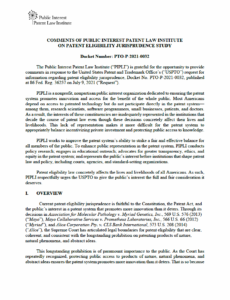Clinic Supports PIPLI in Call for Clear and Robust Patent Eligibility Standards
Cyberlaw Clinic » Blog 2021-11-01
 On October 15, 2021, the Cyberlaw Clinic submitted a Comment on behalf of the Public Interest Patent Law Institute (PIPLI), a nonprofit, nonpartisan organization dedicated to ensuring that the patent system promotes innovation and benefits the public. The Comment responded to the United States Patent and Trademark Office’s (USPTO’s) Request for Information seeking opinions on the current state of patent eligibility jurisprudence. That jurisprudence — including a quartet of Supreme Court decisions in Bilski, Mayo, Myriad, and Alice — reinforced the importance of baseline standards that the USPTO and federal courts should apply in determining whether a patent application involves eligible subject matter.
On October 15, 2021, the Cyberlaw Clinic submitted a Comment on behalf of the Public Interest Patent Law Institute (PIPLI), a nonprofit, nonpartisan organization dedicated to ensuring that the patent system promotes innovation and benefits the public. The Comment responded to the United States Patent and Trademark Office’s (USPTO’s) Request for Information seeking opinions on the current state of patent eligibility jurisprudence. That jurisprudence — including a quartet of Supreme Court decisions in Bilski, Mayo, Myriad, and Alice — reinforced the importance of baseline standards that the USPTO and federal courts should apply in determining whether a patent application involves eligible subject matter.
The Request for Information was published during an important moment of time in which (a) the Biden administration was considering candidates to be director of the USPTO and (b) Congress was signaling strong interest in the patent system, as indicated by numerous patent-related bill proposals. The USPTO published the Request for Information in response to senators who “indicated a particular interest in learning how the current [patent eligibility] jurisprudence has adversely impacted investment and innovation.” In so doing, it framed the Supreme Court’s efforts to protect minimum standards for patent eligibility as distinctly negative.
In fact, as PIPLI and the Clinic make clear in the Comment, current patent eligibility criteria are faithful to the Constitution and have had a strong positive effect on innovation, research, and public health. Today’s eligibility standards prohibit the patenting of natural phenomenon, laws of nature, and abstract ideas. Because these are not products of human invention, the Supreme Court has long interpreted the Constitution and the Patent Act to prohibit patenting them. These prohibitions are essential to ensuring public access to the building blocks of research and knowledge.
PIPLI and the Clinic focus on describing how eligibility standards have positively affected public health during the COVID-19 pandemic. In particular, the Comment explains that existing patent eligibility jurisprudence facilitated more advanced, accessible, and affordable clinical testing, tracking, and treatment. In light of their benefits to the public and fidelity the Constitution, the Comment urges the USPTO to preserve and enforce current patent eligibility standards.
PIPLI is one of many public voices supporting the Supreme Court’s patent eligibility jurisprudence. Others include:
- the Wikimedia Foundation, whose Comment explains that current patent eligibility standards “help ensure that people have the freedom to create, develop, provide, maintain, and use technology that allows them to access and share information with each other”;
- the College of American Pathologists, whose Comment emphasizes that eliminating patent eligibility limitations “would significantly obstruct scientific innovation and harm healthcare delivery”; and
- David Hornik, a leading venture capitalist and Lecturer at Harvard Law School and Stanford Business School, whose Comment describes how “today’s laws against patenting abstract ideas have enabled entrepreneurs, innovators, and start-ups to more efficiently deploy capital” toward innovative and productive activities.
The Cyberlaw Clinic was pleased to have the opportunity to collaborate closely with Alex Moss, Executive Director of PIPLI, on the Comment. “Protecting public access to abstract ideas, laws of nature, and natural phenomena is of paramount importance. The Cyberlaw Clinic’s assistance demonstrating that has been invaluable. We hope the USPTO and Congress pay attention to the groundswell of public support for today’s patent eligibility law.”
Alongside Alex Moss, the Comment was authored by fall 2021 Cyberlaw Clinic students Anthony Pericolo (JD ‘23) and Falicia Elenberg (JD ‘23), who worked closely with Harvard law School Clinical Professor Christopher Bavitz. “I came to law school to promote a patent system that delivers life-saving technology to those who need it most, and I was honored to work on a project that raised awareness about how much the patent system touches people’s lives,” said Anthony Pericolo. Noted Falicia Elenberg, “not only is public health at stake, but current patent eligibility law plays a large role in facilitating innovation by creating the freedom to invent.”
The Clinic looks forward to tracking the USPTO’s efforts in this space.